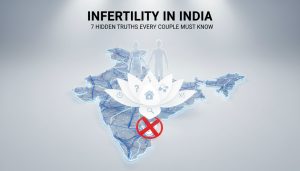Every culture celebrates the onset of pregnancy and the homecoming of a child is a great way and hence, the social pressure to procreate, to share the ‘good news’, to continue the family name is immense.
In fact, relatives start asking about the new member of the family as soon as a couple gets married. This social pressure to have children is more pronounced in some cultures as compared to others.
But what happens when a couple is unable to have children? What happens if a couple is infertile?
The Stigma attached to infertility-
A big step towards breaking the social pressure and the stigmas attached to the issue of infertility is when a couple ‘accepts’ that they are infertile. According to the WHO, infertility is increasing at the rate of 17% year over year. Yet the treatment is out of reach for 99% of couples in India.
This is primarily because couples are often shy or avoid seeking professional help.
In India, infertility is considered a stigma. This is true about most families and most parts of the country. Although there are some progressive families, issues about sex and infertility are still taboo and not discussed.
To add to this, male infertility is a bigger problem. Due to social pressure, most families push the blame of not being able to have children on the woman.
This is more evident in cases of secondary infertility, where a woman faces difficulty in becoming pregnant or carrying a baby to full term after previously giving birth to at least one child.
Men themselves attach too much importance to their virility and feel that anything that indicates that they cannot procreate questions their masculinity.
Therefore, understanding and accepting male infertility is important.
Dealing with the social pressure to have children-
When struggling with infertility and trying to deal with it, the only question on one’s mind is ‘when are you going to have a kid’.
When someone else asks the same question, one is bound to feel helpless or irritable. Because ‘you really don’t know when you’re going to have a baby’!
In most cultures, such as ours, asking about personal lives is equivalent to making small talk. Most of the time, people unknowingly ask questions when they are not sure what else to talk about.
The strategy to deal with such social pressure can range from either ignoring the question with a smile or you could give a rather sarcastic remark like ‘Well, we were thinking 15th June 2020 will be a good date”, or you could divert the topic by asking something about themselves, such as “I don’t know, You tell me what’s up with your child?”.
If it is a close and trusted friend or relative one may want to share that “We are trying, unfortunately, we just realized that having a baby isn’t that easy and there are so many factors that come into play”.
However, remember that you do not owe anyone any explanation! Your personal life is your business and nobody else’s. It will be nice if you can make people realize this.
Read Here You’re not alone! Read about these celebrities who struggled with infertility
Finding solutions to break Social pressure-
Unacceptance further hinders people from visiting doctors or seeking help. People would rather go to a ‘Baba’ who will chant mantras and provide jadibootis to make one more ‘fertile’ than visit a trained gynecologist.
It is true that belief can sometimes work wonders.
However, knowledge and information are some of the tools by which such stigmas can be attacked. Secondly, open discussion and forums where people share their experiences, discuss mental pressures of infertility and different treatment procedures can go a long way in clearing a lot of doubts.
With the growth of the internet and the extent of its reach, many people today seek answers online.
They are also more comfortable discussing their personal lives online due to the anonymity it provides. Today most people do their research on many matters online before they meet a doctor.
It is always okay to equip oneself with valid information and regulated groups that can clear many myths and doubts.






